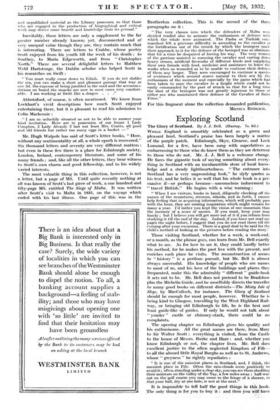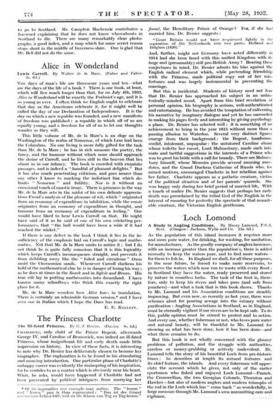Exploring Scotland
The Glory of Scotland. By J. J. Bell. (Harrap. 7s. 6d.) WHILE England is smoothly celebrated as a green and pleasant land, Scotland's praise has been largely a matter of the purple patch. Edinburgh, Skye, Glencoe, and Loch Lomond, for a few, have been sung with superlatives as embarrassing to those who do know them as they are deterrent to those who do not. Mr. J. J. Bell is a welcome change. He faces the gigantic task of saying something about every- . thing in Scotland with an inexhaustible store of local know- ledge and a steady lightheartedness. " The entrance into Scotland has a very unpromising look," he slyly quotes as his text, and he belies it so well that his whole book is a per- suasive if—or perhaps because—unconscious inducement to " travel British." He begins with a wise warning : " When I see visitors, books in hand, diligently checking off the names of the mountains, streams, islands, and so forth, I cannot help feeling that in acquiring information, which will probably pass with the hour, they are missing inspiration which might remain for many a year. I'd rather you kept the vision of one mountain than the memory of a score of names. • If you must, keep your map handy ; but I believe you will get more out of it if you refrain from studying it till the end of the day. Indeed, if you have not read my pages the night before, I suggest that you do not read them till the evening after your excursion.. There is a good deal to be said for the child's method of looking at the pictures before reading the story."
Those visiting Scotland, whether for a week, a week-end, or a month, as the phrase goes, can learn from Mr. Bell exactly what to see. As for how to see it, they could hardly better his method, for he makes the past live with the present, and enriches each place he visits. The reconstruction of scenes in " history " is a perilous pursuit, but Mr. Bell is almost always successful. His knowledge of people who are names to most of us, and his love of the buildings and places they frequented, make this the admirably " different " guide-book it sets out to be. Mr. Bell does not pretend to be Bradshaw plus the Michelin Guide, and he unselfishly directs the traveller to many good books on different districts—The Misty Isle of Skye, by MacCulloch, for instance. The Glory of Scotland should be enough for most people, however. Whether he is being kind to Glasgow, travelling by the West Highland Rail- way, or bringing old Edinburgh to life, be is the best and least guide-like of guides. If only he would not talk about
yonder " castle or chimney-stack, there could be no complaints.
The opening chapter on Edinburgh gives his quality and his enthusiasms. All the great names are there, from Mary to Sir Walter Scott : everything is visited, from the Castle to the house of Messrs. Burke and Hare : and, whether you know Edinburgh or not, the chapter lives. Mr. Bell does excellent justice to the often neglected Kingdom of Fife— to all the absurd little Royal Burghs as well as to St. Andrews, whose " greyness " he rightly repudiates :
It is one of the sunniest places in Scotland, and, I think, the sunniest place in Fife. Often the rain-clouds seem positively to avoid it; often, standing under a clear sky, you can see them shedding their moisture on-the t011ey Of the Tay, a few miles away ; half-way out on the-golf course you may come to the fringe of a shower, so . that, your ball, dry at one hole, is wet at the next.'.
It is impossible to tell half the good things in this' Xiook. The only thing is for you to buy it : and then You v"fill-have
in go to Scotland. Mr. Compton Mackenzie contributes a foreword explaining that he does not know whereabouts in Scotland to die. There are many remarkably clear photo- graphs, a good index, and a map which for some secret reason stops short in the middle of Inverness-shire. One is glad that Mr. Bell did not do the same.









































 Previous page
Previous page